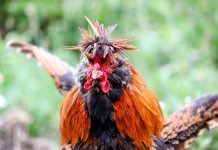BY ROMMEN YNION
FOR almost a year now, I have been immersed in organic farming. There is no book on the subject, perhaps, that has escaped my attention. Yes, I read them all. From vermi-composting to greenhouse development, I assimilated them as if by osmosis.
Aside from the vicarious experience derived from this vast repository of natural “agri” literature, I am now developing an organic farm in Alfonso, Cavite, that has now become a source of inspiration and livelihood.
Organic farming has been a journey that has transformed me into a totally different human being. I am now more “cooperative” with nature in the sense that everything that I do now is deeply rooted in it.
But aside from that, I have seen in my natural farm the reason why the world has become the garbage bin that it is now, full of pollutants that has poisoned the human race. And yet, this reality only dawned on me after I immersed myself in organic farming.
What is in organic farming then that taught about this reality? Briefly, I have to narrate my experience to illustrate how I stumbled upon the knowledge which equipped me with the foresight that humanity, as it is, is doomed to extinction because of its “poisoned” world.
When I started developing my organic farm, I had to literally hack it first out of a jungle in which I saw snakes, monkeys and, yes, cats. All of them wild, of course. The foliage was so thick that if there was somebody wading through it alongside me, I wouldn’t be able to see him.
Insulated from ravages of real estate development in Cavite, the jungle remained untouched until I touched it with my determination to develop an organic farm more as an advocacy than a business venture.
As is my wont, I served as a catalyst in that jungle, causing a whirlwind of activities that in three months, an organic farm emerged from what used to be a sight that can be likened to a picture of an Abu Sayyaf lair in the jungles of Jolo.
Yes, nature could not withstand the onslaught of my organic farm development. It had to bow to me in three months. And by February 2014, I was already in the position to plant high-value crops, ranging from bell peppers to arugula.
As I planted them with the guidance of organic farming experts from the University of the Philippines in Los Baños, I learned that there was a plethora of do’s and don’ts in a field of endeavor totally new to me at that time.
But since this space cannot afford an enumeration of them, they can all be summed up in a few words: Avoid chemicals at all costs. I remember asking my consultant why chemicals were anathema to organic farming. And quizzically, he looked at me before saying albeit jokingly, “What planet are you from?”
Little did I know then that organic farming was the antidote of conventional farming that is rooted in the use of chemicals in growing crops and in the process, destroys the environment and poisons the human beings dependent on it.
I asked organic farming experts what chemicals are used in them and I almost fell off my chair when they revealed that aside from cancer-causing pesticides, formalin was also applied on harvested crops to prolong their shelf lives.
Formalin is commonly used in embalming corpses to “mummify” them. In short, long before people die nowadays, they are already being embalmed by the vegetables they buy from the marketplace.
“And those are the vegetables that people eat, knowingly or unknowingly,” my consultant said. “They are literally poisoning themselves every time they eat vegetables grown the conventional way.”
He also stressed that health problems, ranging from cancer to even Alzheimer’s syndrome, can be traced to the chemically-grown vegetables and even livestock that have inundated the market for ages.
“Not knowing the truth about these ‘conventional’ products, people just consume them,” he said. “But with organic farming, they can little by little learn that there is an alternative for a healthier lifestyle.”
For the past several months, organic farming has opened a whole new world to me, one that is more in tune with nature than with any form of artificiality that has become the hallmark of this thing called “civilization.”
As an organic farmer, I have committed myself to natural farming methods that have enabled me to embrace the fact that the natural way is still the best way. Yes, it may not be as profitable as the artificial way, but it is the only way that I am sure God will never frown upon.
Today, our organically-grown vegetables have now ended up on the dining tables of hotels, restaurants, and households all over Metro Manila. Yes, it’s good business. But most of all, it’s good for the environment. And, it’s good for the people who care for themselves./PN







